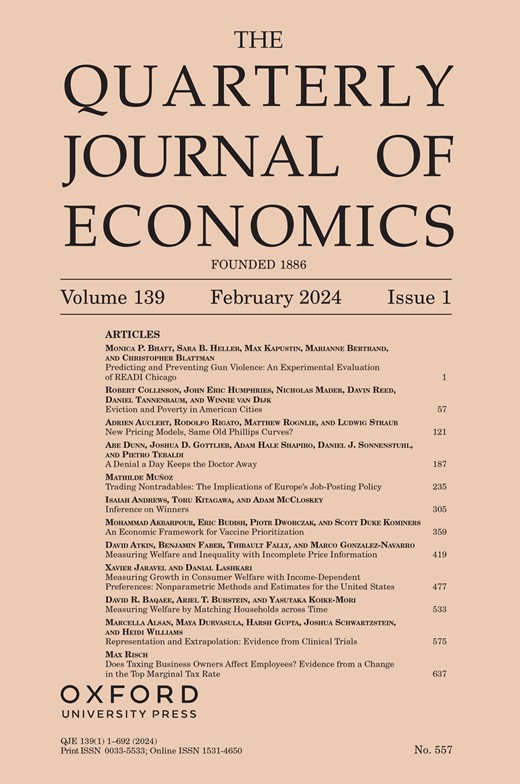你所看到的就是一切*
IF 12.7
1区 经济学
Q1 ECONOMICS
引用次数: 31
摘要
新闻报道和传播本质上受到空间、时间和注意力的限制。因此,新闻来源经常根据信号和观众先前的信念之间的相似性来决定是否共享一条信息,这会产生样本选择问题。本文通过实验研究了人们如何在这些背景下形成信念,特别是统计推理中错误背后的机制。我记录了相当一部分实验参与者遵循一个简单的“你所看到的就是一切”启发式,根据这个启发式,参与者只考虑眼前的信息,并直接使用样本均值来估计总体均值。一系列旨在识别机制的治疗表明,对于许多参与者来说,他们甚至不会想到未观察到的信号。我提供了因果证据,证明这种不正确的心理模型的频率是决策问题计算复杂性的函数。这些结果指出了脑海中浮现的内容的上下文依赖性,以及由此产生的信念更新错误。本文章由计算机程序翻译,如有差异,请以英文原文为准。
What You See Is All There Is*
News reports and communication are inherently constrained by space, time, and attention. As a result, news sources often condition the decision of whether to share a piece of information on the similarity between the signal and the prior belief of the audience, which generates a sample selection problem. This article experimentally studies how people form beliefs in these contexts, in particular the mechanisms behind errors in statistical reasoning. I document that a substantial fraction of experimental participants follows a simple “what you see is all there is” heuristic, according to which participants exclusively consider information that is right in front of them, and directly use the sample mean to estimate the population mean. A series of treatments aimed at identifying mechanisms suggests that for many participants, unobserved signals do not even come to mind. I provide causal evidence that the frequency of such incorrect mental models is a function of the computational complexity of the decision problem. These results point to the context dependence of what comes to mind and the resulting errors in belief updating.
求助全文
通过发布文献求助,成功后即可免费获取论文全文。
去求助
来源期刊

Quarterly Journal of Economics
ECONOMICS-
CiteScore
24.20
自引率
2.20%
发文量
42
期刊介绍:
The Quarterly Journal of Economics stands as the oldest professional journal of economics in the English language. Published under the editorial guidance of Harvard University's Department of Economics, it comprehensively covers all aspects of the field. Esteemed by professional and academic economists as well as students worldwide, QJE holds unparalleled value in the economic discourse.
 求助内容:
求助内容: 应助结果提醒方式:
应助结果提醒方式:


